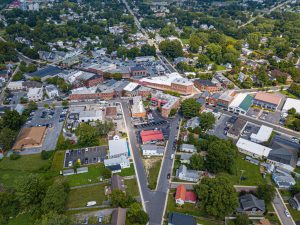
BERLIN– The town could soon hire a planning consultant to guide residents through a discussion about growth.
Planning Director Dave Engelhart told the Berlin Planning Commission last week to start thinking about items they’d like to discuss with a consultant. He said funding was allocated within his department’s budget to bring a planning expert to town later this year.
“I’d love to know if they could find another small town, similar to Berlin, that’s been on the same trajectory, and find out what went right and what went wrong,” commission member Matt Stoehr said.
Engelhart told the commission that because every proposed annexation brought out a mix of residents opposed to and in support of growth, he believed Berlin should bring in a consultant to help the town determine what its future should look like. He said there was funding for the project allocated within the planning department’s budget.
Stoehr was quick to express interest in the idea. He pointed out that the town was growing quickly and that residents needed to understand the impact of that. He noted that residents were concerned about taxes and utility fees but said there were other issues tied to growth that needed to be discussed. Stoehr said that even as a planning commission member, he didn’t have a good understanding of the town’s wastewater operations and wanted to know more about when growth would force a wastewater treatment plant expansion, for example.
Engelhart said the town was already planning for an expansion but said that was an excellent point.
“It’s one of the elements of this growth discussion,” he said.
Stoehr also asked about the greenbelt concept that comes up from time to time in planning commission meetings. Engelhart said creating a greenbelt—undeveloped land that surrounds an urban area—was discussed during the last comprehensive planning process.
“It’s a very complicated issue,” Engelhart said. “I’m not saying that means it shouldn’t be undertaken.”
Commission member Pete Cosby, the most vocal proponent of the greenbelt concept, said the town currently had some control in maintaining green space on the town’s borders.
“The tool we have right now is it’s not economically feasible for a developer to deal with the county on these perimeter properties,” he said, indicating that if properties weren’t annexed they didn’t have access to town water and sewer.
Cosby said that while it was already too late for green space on the eastern edge of town, there was a chance to maintain the space at the town’s west.
“Our current weapon is we’re not going to annex property to the west at least,” he said.
Cosby said that the town also needed to review connectivity for bicycles and pedestrians throughout town.
Chris Denny, chair of the commission, said these discussions had all been had before. He said there could be a better use for the funding.
“If we don’t spend it someone else is going to spend it,” Cosby replied. “Until somebody wakes up politically and stops this kind of waste we ought to burn the money if it’s available to us.”
Going back to Cosby’s reference to annexation, Stoehr said he often heard residents decry the process but wasn’t sure exactly why it was such a bad move for the town.
“I think that’s poppycock,” Engelhart said.
He told the commission that from his point of view, annexation made sense when the property was a commercial one that was already developed. If there’s a business located outside the town’s boundaries, the town is not getting any tax revenue for it. If it is annexed, however, Engelhart said the property owner would be forced to pay for the costs of connecting to town infrastructure and buy EDUs (equivalent dwelling units) and the town would benefit from tax revenue going forward.
“The highest tax revenue the town can ever get is out of commercial property,” Engelhart said. “The town needs funds every year to continue to give townspeople the services they’re accustomed to.”
He said it was important for officials to look at all angles of an annexation. While annexation of farmland might not make sense if the town was trying to limit growth, he said annexing commercial property that was already home to an existing business was a different matter.
“You have to look at both sides of it,” he said.
Cosby said the town’s definition from the west was part of what made it special and he felt that was a valuable amenity that should be preserved.
“There’s opportunity for infill in the town already,” commission member Austin Purnell said.
Denny said again he just didn’t want to see the money wasted. He said he’d spent a lot of time participating in a parking study the town had started years ago and that nothing had ever come of it.
“A lot of stuff gets talked to death and money just gets wasted because it’s pretty, it comes from a grant tree,” he said.
Cosby agreed that the commission wanted to see practical implementation but pointed out that a lot of the process would be defined by the level of citizen involvement.
“The problem is you don’t get moderates to come to those things,” he said. “You get people with an issue. And they only hear one side.”

